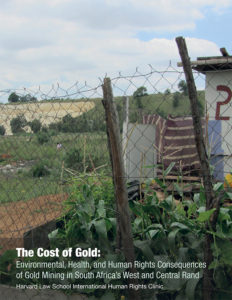Via International Human Rights Clinic
South Africa: Protect Residents’ Rights from Effects of Mining
Government Response to Environmental and Health Threats Falls Short
 (Cambridge, MA, October 12, 2016)—South Africa has failed to meet its human rights obligations to address the environmental and health effects of gold mining in and around Johannesburg, the Harvard Law School International Human Rights Clinic (IHRC) said in a new report released today.
(Cambridge, MA, October 12, 2016)—South Africa has failed to meet its human rights obligations to address the environmental and health effects of gold mining in and around Johannesburg, the Harvard Law School International Human Rights Clinic (IHRC) said in a new report released today.
The 113-page report, The Cost of Gold, documents the threats posed by water, air, and soil pollution from mining in the West and Central Rand. Acid mine drainage has contaminated water bodies that residents use to irrigate crops, water livestock, wash clothes, and swim. Dust from mine waste dumps has blanketed communities. The government has allowed homes to be built near and sometimes on those toxic and radioactive dumps.
Examining the situation through a human rights lens, the report finds that South Africa has not fully complied with constitutional or international law. The government has not only inadequately mitigated the harm from abandoned and active mines, but it has also offered scant warnings of the risks, performed few scientific studies about the health effects, and rarely engaged with residents on mining matters.
“Gold mining has both endangered and disempowered the people of the West and Central Rand,” said Bonnie Docherty, senior clinical instructor at IHRC and the report’s lead author. “Despite some signs of progress, the government’s response to the crisis has been insufficient and unacceptably slow.”
Filed in: Clinical Spotlight
Contact Office of Clinical and Pro Bono Programs
Website:
hls.harvard.edu/clinics
Email:
clinical@law.harvard.edu